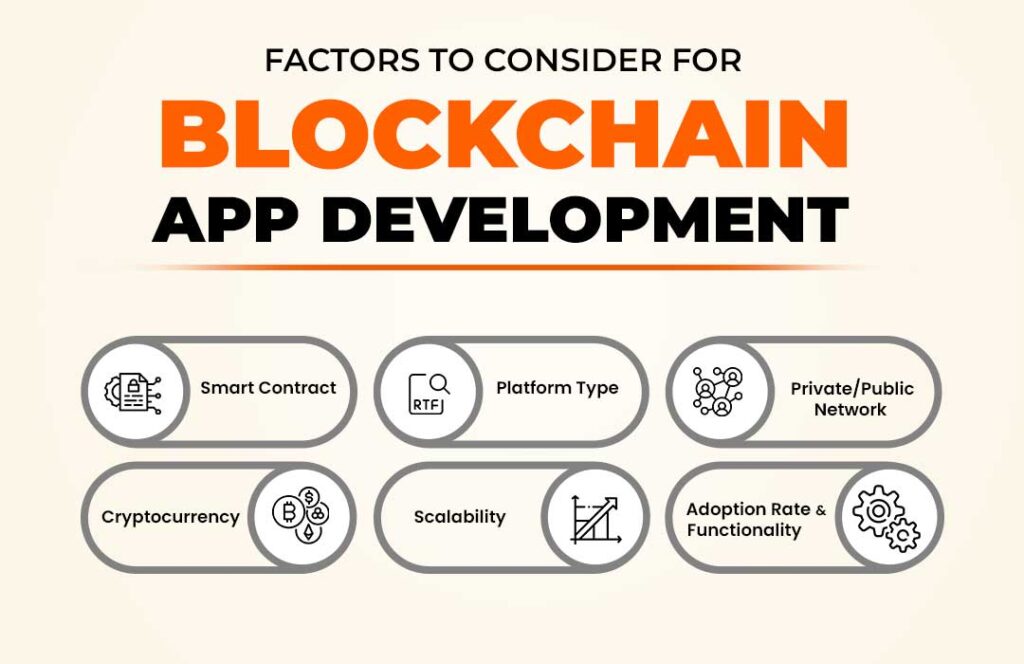Blockchain technology has revolutionized how businesses work. Because it is autonomous and can’t be changed, it offers security and clarity that can’t be beat. This makes it a key tool for business development. This blog explores how blockchain app development can change businesses for the better. Businesses can use blockchain to improve operations, spur innovation, and gain a competitive edge in the digital market by looking into its benefits, such as better security and simpler processes.
What is blockchain, and how it works?
Blockchain technology works like an independent digital ledger, using a network of computers to keep track of events. A chain of blocks is made up of transactions that are safely linked to each other. Because blockchain is immutable, it can’t be changed once a transaction is recorded. This makes it safer and more trustworthy. Transparency lets everyone in the network see a record of all transactions, encouraging responsibility. When a network is decentralized, no one group controls it. This makes it less likely that it will be hacked or censored.
What are the features of Blockchain Technology
Immutability
A transaction can’t be changed or removed once it’s been added to the blockchain. Because it is almost hard to change past data, immutability increases trust and security.
Being honest
Everyone in the network can see all the events recorded on the blockchain. Users are more likely to be responsible and trusting when deals are clear and can be checked by themselves.
Loss of control
Blockchain is based on a network of computers called “nodes.” There is no single authority or point of control for the network. Decentralization eliminates the need for intermediaries, which lowers the risk of control, fraud, or single points of failure.
Ways to Reach a Consensus
Consensus methods ensure that everyone in the network agrees on acceptable transactions.
Proof of Work (PoW), Proof of Stake (PoS), and Practical Byzantine Fault Tolerance (PBFT) are some of the consensus methods that make sure transactions are true and the blockchain is safe.
Keep safe
The transactions and data on the blockchain are safe because of cryptography tools like hashing and digital signatures. The security features of blockchain keep theft, illegal access, and data tampering at bay.
Ability to grow
The term “scalability” refers to a blockchain network’s ability to handle more transactions without slowing down. Sharding, sidechains, and off-chain transactions are scaling methods that make blockchains more scalable and fast.
Deals that are smart
Smart contracts are agreements that follow the rules and are stored on the blockchain. When certain conditions are met, they automatically carry out and enforce contracts, so there’s no need for intermediaries.
Compatible use
Interoperability makes it possible for blockchain networks to talk to and interact with each other without any problems.
Standardized standards and communication solutions make collaborating and sharing data easier for people on different blockchain platforms.
The three main types of blockchains are public, private, and consortium.
Different kinds of blockchains are made for different purposes. Anyone can use public blockchains like Bitcoin and Ethereum, which are open and not controlled by a single group. Private blockchains only let people who can view them in, giving you more protection and control. Consortium blockchains combine the best parts of public and private blockchains by being run by a group of companies working together on a shared network.
How can blockchain be used in different industries?
Different types of businesses have found uses for blockchain technology. It makes financial deals safer and more open, cutting the need for intermediaries and dropping costs. Blockchain makes it possible to track goods in real time, which improves speed and makes it easier to find things. It protects the accuracy and usability of patient information in healthcare, leading to better patient care and better data handling. Blockchain technology is also useful in transportation, vote systems, intellectual property control, and other fields.
Why is blockchain important for business change?
Traditional business systems have many problems, such as inefficiency, unclearness, security holes, and needing third parties to help them work. Data leaks, scams, and abuse are more likely to happen in centralized systems. Inefficient operations and higher costs are also caused by long payment times and difficult human processes.
How Blockchain Can Help With These Problems?
Blockchain technology can help standard systems fix the problems they have. Because it is autonomous, no middlemen are needed, which cuts costs and improves security. It is impossible to change immutable data, which protects it from theft and tampering. Thanks to transparency and tracking, stakeholders can see past transactions in real-time, which builds trust and responsibility. Smart contracts handle the performance of contracts, which speeds up processes and lowers the chance of mistakes. The spread record of blockchain also makes it possible to settle deals faster and more efficiently, which improves organizational efficiency.
Why blockchain is good for business processes?

Blockchain has many benefits for business processes, such as
- Better security: Blockchain is naturally safe because it uses decentralized cryptography, which stops theft and illegal access.
- Transparency and belief: Records that are clear and can’t be changed help partners believe each other and let them check deals on their own.
- Cost Reduction: Reducing intermediaries, automating processes, and streamlining operations all lower the costs of using standard systems.
- More efficient: Real-time payment, smart contracts that automate chores, and improved processes make operations more efficient.
- Opening up new ways to innovate: Blockchain makes it possible to do things like tokenizing assets, decentralized finance (DeFi), and supply chain efficiency.
Advantages of Making Blockchain Apps
Better accountability and openness
Blockchain app development improves openness by giving everyone access in real-time to transaction records that can’t be changed and are clear. This openness builds trust among players by letting them check deals independently. Blockchain also allows for tracking throughout the supply chain, which means that companies can see where goods come from and how they get to their final location.
Better safety and data integrity
Through secret methods and sharing, blockchain technology makes data more secure and reliable. Each transaction is cryptographically linked to the one before it, so it can’t be changed, and fraud can’t happen. Decentralization ensures there isn’t a single point of failure, which lowers the chance of data leaks and people getting in without permission.
Cost savings and bigger gains in efficiency
Blockchain app creation makes business processes more efficient, which saves money and time. Automating manual jobs like comparing data and carrying out contracts reduces mistakes people make and business costs. Getting rid of intermediaries and streamlining processes also lowers the cost of transactions.
Making transactions without trust easier
Blockchain makes trustless deals possible by letting people do business directly with each other without the need for trusted third parties or mediators. Smart contracts, which automatically carry out their terms when certain conditions are met, automate trade processes and ensure that contracts are carried out as agreed upon.
Streamlining the management of the supply chain
Blockchain changes supply chain management by making the whole chain visible and trackable in real-time. Blockchain app development lets businesses keep track of where their things are at all times, ensure the products they sell are real, and follow all the rules. This openness and ability to track goods lowers the chance of fakes, makes it easier to keep track of inventory, and boosts the efficiency of the supply chain.
Using smart contracts to automate the execution of contracts
Smart contracts make it possible for blockchain app creation to automate the performance of contracts. When certain conditions are met, these self-executing contracts automatically execute the deals. This eliminates the need for intermediaries and lowers the costs and times of transactions. Smart contracts simplify business processes, make them safer, and run more smoothly.
How do you start making blockchain apps for business transformation?

To start making blockchain apps for business change, you need to know how to code, plan strategically, and understand the unique benefits of blockchain technology. Here’s an organized way to start this journey:
1. Learn the basics of blockchain
Before you start making blockchain apps, you need to know a lot about blockchain technology. You need to know its design, how consensus works, and how different blockchain systems (like Ethereum, Hyperledger Fabric, etc.) are different. Online classes, workshops, and forums for blockchain developers can be very helpful resources.
2. Figure out what the business issue is
Make it clear what business problem you want to solve with blockchain technology. Think about how the benefits of blockchain, like its ability to be open, safe, and efficient, can be used to make things better. This could be done in any area where trust and openness are important, like in banking deals, name verification, or managing the supply chain.
3. Pick the right blockchain platform
Pick a blockchain tool that works for your company. Think about things like how the platform can be scaled, its security features, its decision method, and the computer languages it supports. For smart contracts and decentralized apps (DApps), Ethereum is a popular platform. Hyperledger is popular for private blockchains, and Binance Smart Chain is popular for high-throughput DApps.
4. Make the application for blockchain
When you make your blockchain app, you should think about the user experience (UX) and the business methods it will change or improve. Draw out the app’s design, including how it will connect to other apps and data sources. Choose the reasoning of the smart contract, which will make processes run automatically based on rules that have already been set.
5. Make the application and test it
Start making your blockchain app using the development tools and languages for the platform you chose (for example, Solidity for Ethereum). Follow the best ways to code and keep your data safe. Before putting the app on the main network, make sure you test it thoroughly for bugs, speed issues, and security holes, ideally in a test blockchain environment.
6. Put the app online and keep it up to date
Put your blockchain app into use after trying it. Setting up the blockchain system (nodes, agreement process, etc.) and putting smart contracts into action are part of this. Once the app is live, keep an eye on it for speed and safety, and be ready to make changes as needed based on user comments and changing business needs.
7. Teach Users and Stakeholders
Teach users and partners about the benefits of your blockchain application and how it works. This could include training classes, user guides, and ongoing help to ensure the system is easy to use and adopt.
8. Look at and rate
Check the app’s effect on your business processes and general goals for business change regularly. Get feedback from users and other important people to find ways to make things better. As your app shows its worth, you might want to expand it to other parts of your business or add more features to make it even better.
How do you deal with problems and risks in blockchain app development?
Legal and regulatory issues to think about
In blockchain app creation, knowing how to deal with government systems and legal requirements is important. Ensuring that rules about data privacy, financial transactions, and protecting consumers are followed is important to stay out of trouble with the law and avoid fines.
Problems with interoperability and scalability
When you combine blockchain apps with other blockchain platforms or systems already in use, interoperability issues can arise. Concerns about scalability have to do with how well blockchain networks can handle more transactions without slowing down. To solve these problems, you must carefully plan and agree to share norms and scale solutions.
Concerns about privacy and data protection
Protecting privacy and data is very important when making blockchain apps, especially in fields that deal with private data. Using technologies that protect privacy, like zero-knowledge proofs or private/permissioned blockchains, can lower privacy risks and make sure that data security rules are followed.
Problems with integrating old systems
Because of changes in design and standards, it can be hard to connect blockchain apps to older systems. There may be problems with compatibility, so you’ll need to develop your ideas and plan carefully to ensure that the connection and data sharing goes smoothly.
Getting rid of the dangers of fraud and cyberattacks
Unfortunately, hacking and theft can happen to blockchain apps, too. Risks can be reduced by using strong security measures like encryption, multi-factor identification, and voting methods. Continuous tracking, reviewing, and using the best protection techniques also help find and stop possible threats to the blockchain network.
Future of Blockchain Apps?
Connecting to new technologies like AI and IoT
New technologies like Artificial Intelligence (AI) and the Internet of Things (IoT) will soon be able to work with blockchain to make new solutions. The coming together of these technologies can make data safer, automate tasks, and open up new uses in many fields.
How Blockchain Standards and Protocols Have Changed Over Time
Standards and methods for blockchains are expected to change over time to make them more interoperable, scalable, and efficient. Standardization efforts will lead to the creation of blockchain networks that are more reliable and can work with other networks. This will encourage more people to use blockchain and work together.
The number of decentralized finance (DeFi) applications is growing
Decentralized Finance (DeFi) apps are becoming more popular. They let people do things like give, borrow, and trade money without going through intermediaries. As DeFi applications become more popular, they are likely to change the way standard finance systems work and make financial services more available worldwide.
Adoption of Blockchain Grows Across Industries
Blockchain will likely be used in more fields than just banking and supply chains. For example, it could be used in healthcare, government, and entertainment. More companies will use blockchain to improve security, efficiency, and openness as more people learn about its benefits and technological hurdles are taken down.
Conclusion
Blockchain app creation has many perks, such as making things more open, safe, and efficient. Using blockchain technology, businesses can improve efficiency, cut costs, and spur new ideas.
Businesses are told to look into blockchain possibilities to stay competitive in a digital world that is changing quickly. Blockchain technology can open up new ways to grow and set yourself apart.
In the future, blockchain technology can completely change industries, business models, and people’s lives. This technology will likely be deeply and widely affected by people and businesses as it grows and improves. Businesses need to stay up-to-date, change with the times, and take advantage of blockchain’s chances for a better future.






What do you think?
It is nice to know your opinion. Leave a comment.